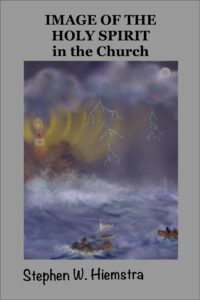The Word

And the Word became flesh and dwelt among us
(John 1:14)
By Stephen W. Hiemstra
More than any New Testament writer, John identified scripture as inspired by the Holy Spirit. John’s Gospel begins with this affirmation: “In the beginning was the Word, and the Word was with God, and the Word was God.” (John 1:1) In the Greek, the first three words here parallel the creation account in the Septuagint. If you missed the first allusion, John 1:4-5 both reference the light, an allusion to Genesis 1:3, drawing out the ethical inference in light, which John ties to a quote from Jesus: “I am the light of the world.” (John 8:12; 9:5, also Matt 5:14).
Nouns and Verbs
While the Greek in John 1:1 clearly reads word—logos: noun, nominative, singular, masculine, Saint Jerome (AD 382) translated logos as verb—Verbum—suggesting action rather than a state of being, as with a typical noun. While the Latin, Verbum, can have a range of inferences, including noun, Jerome’s translation suggests that John saw God’s word as synonymous with God, a stand-in for the Holy Spirit who is actively involved even now in God’s creation. For over a thousand years, Jerome’s Vulgate was the primary translation of the Bible for the church, which suggests that this interpretation of scripture was the orthodox view.
It is a small step from Jerome’s interpretation of logos to the John’s Paraclete whose job description is: “The Helper, the Holy Spirit, whom the Father will send in my name, he will teach you all things and bring to your remembrance all that I have said to you.” (John 14:26) Here the teaching available to us is the transcript of Jesus’ teaching given in the New Testament.
A High View of Scripture
At the end of the Good Shepherd narrative, the Jews proceed to stone Jesus, accusing him of blasphemy. Citing Psalm 82 (also Isaiah 41:23), he responds:
“Jesus answered them, Is it not written in your Law, I said, you are gods? If he called them gods to whom the word of God came—and Scripture cannot be broken—do you say of him whom the Father consecrated and sent into the world, You are blaspheming, because I said, I am the Son of God?” (John 10:34-36)
Note the interjection—“And Scripture cannot be broken”—is attributed to Jesus himself. While the cite in Psalm 82 disarms the Jews and is an interesting use of scripture, it does itself not mention scripture; it simply is scripture. The interjection is uniquely Jesus expressing a high view of scripture.
This pericope stands alone and has no obvious connection to Jesus’ Good Shepherd narrative and serves primarily to illustrate the push-back that Jesus received from the religious authorities. By contrast, Jesus’ interjection reinforces John’s high view of scripture.
This high view of scripture appears in another pericope that is often cited:
“If anyone hears my words and does not keep them, I do not judge him; for I did not come to judge the world but to save the world. The one who rejects me and does not receive my words has a judge; the word that I have spoken will judge him on the last day. For I have not spoken on my own authority, but the Father who sent me has himself given me a commandment—what to say and what to speak.” (John 12:47-49)
The first part of this pericope is widely cited—“I did not come to judge the world but to save the world”—but it is taken out of context.
The next sentence is a hammer: “The one who rejects me and does not receive my words has a judge; the word that I have spoken will judge him on the last day.” Jesus says that his words—our scripture—will be the basis for future judgment of those that reject him. The final sentence serves to reinforce that point: Jesus speaks on authority of God himself.
By citing Jesus, John is telling us that God himself has a high view of scripture. Thus, scripture is not only divinely inspired, it serves for us as law and the basis for future judgment.
Giant Angels
Once we recognize John’s high view of scripture, it comes as little surprise to see this theme reiterated in the Book of Revelations. The “take and eat” (Rev 10:9) instruction given to John by the giant angel in his vision is underscoring the importance of taking scripture seriously. References to the Book of Life (e.g. Rev 3:5) are another. When we eat something, it becomes part of us. Eating scripture is a poetic way to describe the process of memorizing scripture.
In the first century, few people could read and parchment was expensive. Memorizing scripture was an economic necessity for many people, but it served at least two other purposes.
First, scripture memorized is scripture applied in personal devotions and available in evangelism, especially in preaching. Things committed to memory are things important to us, which is obvious to those we talk to.
Second, when religious persecution is widespread, such as in North Korea today, owning scripture in any form can get one into trouble. Committing scripture to memory serves to protect the person memorizing from unnecessary harassment.
Pastors in the Islamic world frequently memorize the entire New Testament much like Islamic students memorize the Koran.
The Word
Also see:
The Face of God in the Parables
The Who Question
Preface to a Life in Tension
Other ways to engage online:
Author site: http://www.StephenWHiemstra.net
Publisher site: http://www.T2Pneuma.com
Newsletter at: https://bit.ly/Ready_Oct23 , Signup
The post The Word appeared first on T2Pneuma.net.



